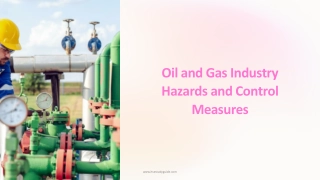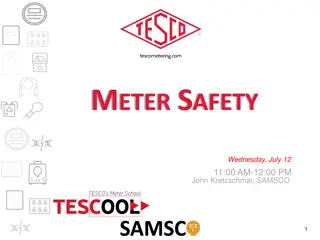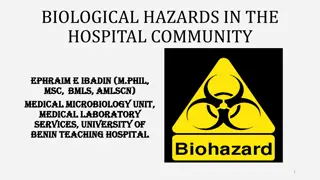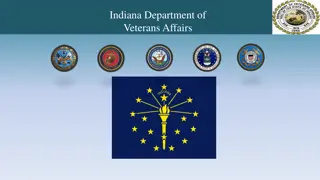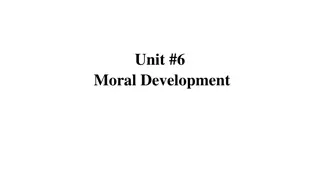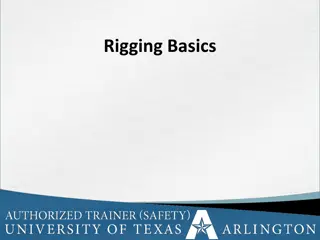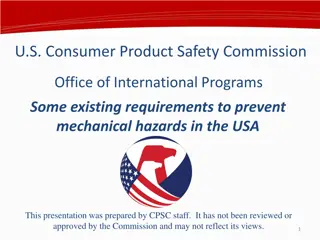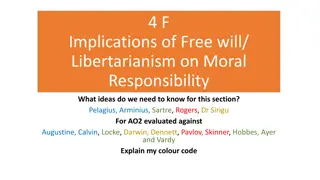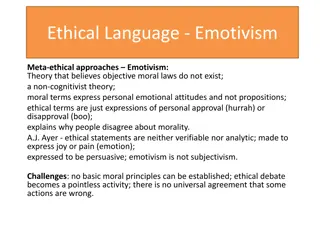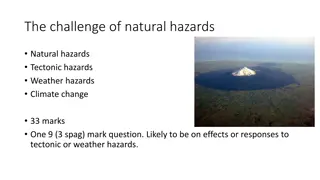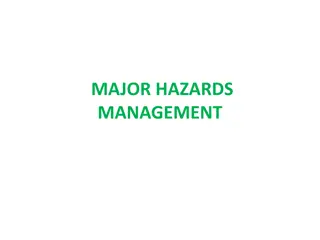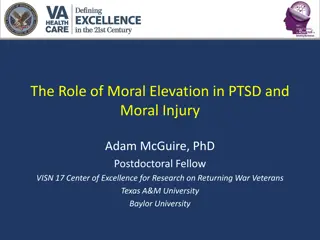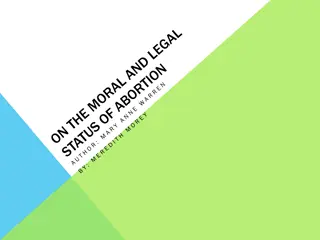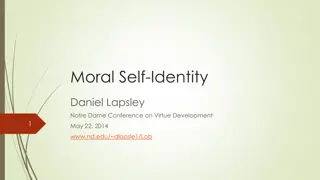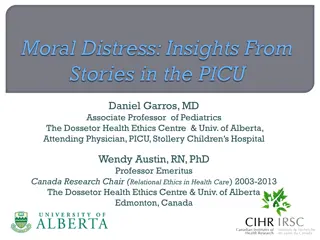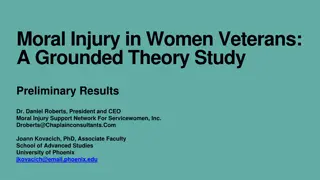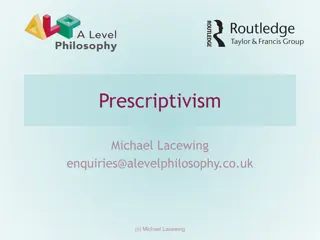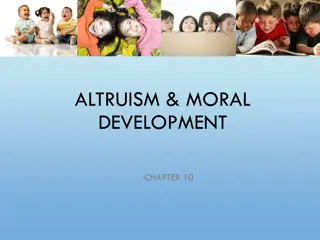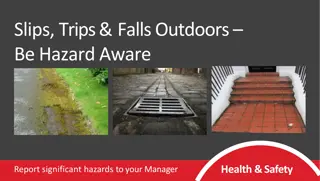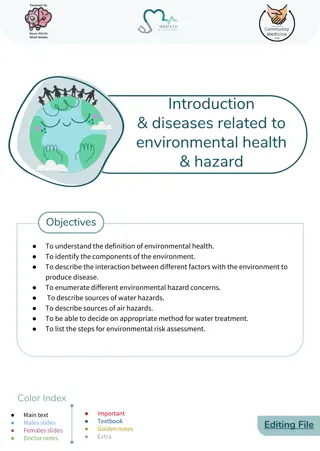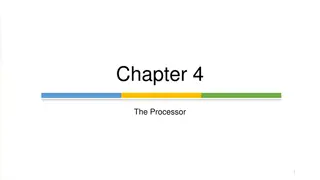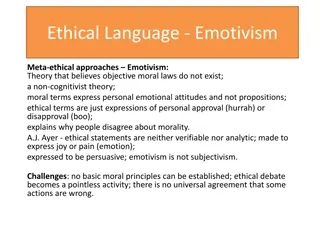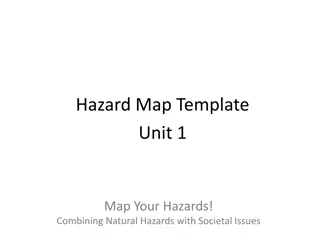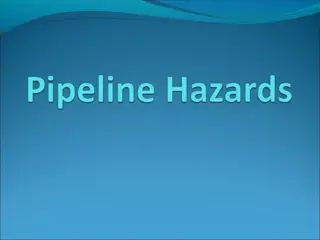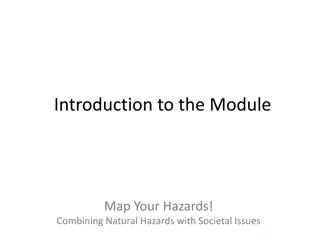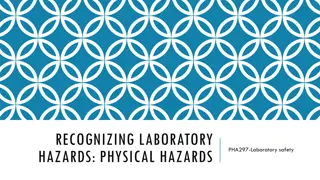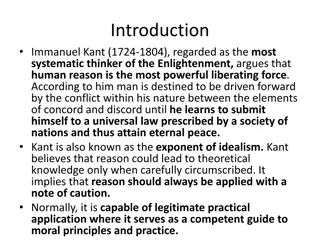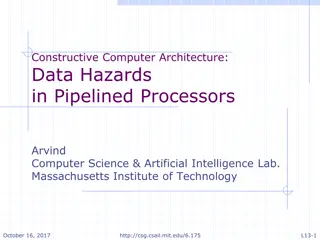Oil and Gas Industry Hazards and Control Measures
Learn to mitigate fire, explosion, exposure, physical hazards, falls, transportation risks, and natural hazards in the oil and gas sector. Effective control measures reduce risks and ensure worker safety. Explore key safety protocols.
2 views • 13 slides
Ensuring Mine Road Safety: Key Controls and Hazards
National Mine Safety Week 2023 focuses on safe road conditions in mining areas. The environment poses risks like overhanging trees and weather conditions, while road-related hazards include heavy loads and road design issues. This article highlights driving hazards, road design and maintenance hazar
0 views • 9 slides
Workplace Hazards and Safety Measures Awareness
Learn about common workplace hazards such as falls, chemical exposure, fire, electrical hazards, and repetitive motion injuries. Understand the risks associated with these hazards and the importance of prioritizing safety in the workplace to prevent accidents and injuries. Stay informed and take pro
1 views • 33 slides
Biological Hazards in the Hospital Community
Healthcare workers face various occupational hazards, including biological risks, in hospital settings. This article by Ephraim E. Ibadin explores the definition, types, risk factors, sources, prevention, and control of biological hazards in hospitals, emphasizing the importance of protecting worker
0 views • 30 slides
Environmental Hazards Faced by Veterans and Agent Orange Exposure Locations
Veterans may have been exposed to a variety of environmental hazards during their military service, including Agent Orange-related diseases, Gulf War illnesses, radiation-related diseases, traumatic brain injury, and more. Agent Orange exposure locations include Vietnam, C-123 airplanes, Blue Water
1 views • 40 slides
Understanding Kohlberg's Stages of Moral Development
Kohlberg's stages of moral development, built upon Piaget's psychological theory, outline six developmental stages of moral reasoning, with each stage offering a higher level of response to moral dilemmas. Kohlberg focused on justice in moral development and emphasized the importance of how individu
0 views • 19 slides
Understanding Moral Development and Moral Reasoning
Moral development involves an individual's sense of right and wrong, influenced by family, school, friends, and societal environment. Children learn moral concepts from interactions with parents, teachers, peers, and society, shaping their understanding of good and bad. Additionally, moral reasoning
0 views • 13 slides
Essential Crane Safety Training and Hazards Awareness
This training covers various hazards associated with crane use, OSHA standards, inspection guidelines, and common issues like electrical hazards, overloading, and poor weight distribution. The content emphasizes the importance of maintaining crane safety to prevent accidents, injuries, and damage to
0 views • 30 slides
Rigging Safety and Hazards Awareness
Learn about common rigging hazards, including fall hazards, struck-by and crushing hazards, electrical hazards, and rigging failure examples. Understand the importance of proper training, equipment inspection, and safety protocols to prevent accidents and injuries in rigging operations.
0 views • 34 slides
Preventing Mechanical Hazards in Consumer Products: U.S. Regulations
The U.S. Consumer Product Safety Commission (CPSC) enforces various requirements to prevent mechanical hazards in consumer products. These regulations cover toys, children's clothing, infant products, and more. Standards such as ASTM F963 outline specific safety measures for small parts, strangulati
1 views • 13 slides
Moral Responsibility and Free Will Implications in a Contemporary Context
This text delves into the implications of free will and libertarianism on moral responsibility, examining the ideas of various philosophers and thinkers such as Pelagius, Arminius, Sartre, and more. It explores the concepts of moral agency, determinism, normative ethics, religious beliefs, and the c
5 views • 12 slides
Understanding Emotivism in Ethical Philosophy
Emotivism is a meta-ethical theory that rejects objective moral laws, instead positing that moral terms express personal emotional attitudes, not universal truths. Influenced by A.J. Ayer and rejecting naturalism, this theory suggests that ethical statements are not objective propositions but rather
0 views • 28 slides
Understanding Natural Hazards and Their Impacts
Natural hazards, including tectonic and weather-related events, pose significant risks to humans and property. The effects and responses to tectonic hazards vary based on wealth levels in different regions. Earthquakes and volcanic eruptions result from physical processes, with patterns observed alo
1 views • 15 slides
Challenges and Opportunities of Moral Revolution in Indonesia
The need for a moral revolution in Indonesia to address societal issues like corruption, conflict, and intolerance. Contrasting mental and moral revolutions, the focus is on behavior change to build a humane society with healthy moral values. Initiatives and discussions highlight the urgency of tran
0 views • 13 slides
Understanding Environmental Hazards and Management
Exploring major hazards management, geology perspectives, ecological concepts, natural environmental hazards, classes of natural hazards, and introduction to environmental hazards management. The content covers ecological levels, abiotic factors, biomes, environmental degradation, and more.
0 views • 10 slides
Understanding Moral Elevation in PTSD and Moral Injury
The research by Dr. Adam McGuire explores the role of moral elevation in PTSD and moral injury, emphasizing how witnessing virtuous behaviors triggers emotional and physical responses leading to a desire for imitating virtuous acts. By integrating prosocial emotions into trauma treatment, the positi
0 views • 13 slides
Understanding Humanity and Moral Community in the Context of Abortion Ethics
Exploring the complex ethical considerations surrounding abortion, this discussion delves into determining the humanity of a being, defining the moral community based on traits of personhood, fetal development, and the right to life. The arguments include the morality of abortion, the definition of
0 views • 9 slides
Challenges to Moral Anti-Realism: Objections and Responses
The article explores objections to moral anti-realism, including moral nihilism, condemning immorality, and the notion of moral progress in the absence of moral reality. It addresses concerns about the justification for interfering with others' behavior, the relationship between moral beliefs and ob
0 views • 6 slides
Understanding Moral Self-Identity Development
Situating moral self-identity within ethical theory and developmental psychology, this overview explores the centrality of morality within the self-concept. It discusses the chronic accessibility of moral schemas, the importance of strong evaluation in moral behavior, and the connection between mora
0 views • 33 slides
Understanding Moral and Constitutional Values in Relation to Judiciary
Explore the concepts of moral values and constitutional values, emphasizing their importance in decision-making processes and societal norms. Discover the stages of moral development and delve into constitutional values such as sovereignty, socialism, secularism, democracy, justice, liberty, equalit
0 views • 9 slides
Analysis of Moral Language in Political Communication
Explore how Republican and Democratic elites use distinctive moral language and its impact on voters in the context of the 2012 election data. Discover the application of Moral Foundations Theory in understanding political differences in the United States and how moral intuitions influence public op
0 views • 13 slides
The Influence of Disgust on Moral Behavior in Psychological Research
Explore the impact of disgust on moral behavior through various studies, including moral dilemmas and criteria for moral judgment. Research delves into how disgust affects decision-making processes related to moral dilemmas and helping behavior. Discover the connection between physical disgust and i
0 views • 16 slides
Understanding Moral Distress in Healthcare
This content discusses the concept of moral distress in healthcare, defined as the pain and anguish experienced when one knows the right thing to do but faces internal or external barriers preventing action. It explores the implications of moral distress on healthcare practitioners and emphasizes th
0 views • 25 slides
Insights on Moral Injury Among Women Veterans: Preliminary Study Findings
Preliminary results from a grounded theory study on moral injury in U.S. women veterans reveal themes such as sexual assault, hostile work environments, and more. Participants shared their experiences, highlighting the nature of moral injury they faced, distinguishing between various forms of discri
0 views • 21 slides
Understanding Moral Development: Insights and Perspectives
Morality is the belief in right behavior accepted by society. It involves moral behavior, feelings, and judgments. Moral development evolves from childhood to adulthood, influenced by experiences and challenges. Freud's id, ego, and superego theory and Skinner's behaviorism contribute to our underst
0 views • 12 slides
Exploring Moral Judgments and Prescriptive Meaning in Ethics
This content delves into non-cognitivism, Hare’s prescriptivism, and moral anti-realism to understand what we do when making moral judgments. It discusses prescriptive meaning, the concept of good, and how moral language guides actions. The objections raised regarding moral language's functions, p
0 views • 9 slides
Understanding Altruism and Moral Development Theories
Explore the components of morality, theories of moral development by prominent psychologists like Piaget and Kohlberg, and the stages of moral development in individuals. Learn about moral affect, reasoning, and behavior as integral aspects shaping one's ethical framework and decision-making process
0 views • 40 slides
Preventing Slips, Trips, and Falls: Hazard Awareness and Safety Guidelines
Be aware of hazards both indoors and outdoors to prevent slips, trips, and falls. Keep work areas clear, return equipment to designated places, and report hazards to managers promptly. Look ahead for hazards, avoid distractions while walking, and conduct dynamic risk assessments to ensure safety. Re
0 views • 4 slides
Understanding Environmental Health and Hazards
The field of environmental health focuses on preventing human injury and illness by evaluating and limiting exposure to hazardous agents in the air, water, and soil. Various environmental hazards such as water and air pollution, climate change, and occupational hazards pose significant risks to huma
0 views • 10 slides
Friedrich Nietzsche's Genealogy of Morals: Uncovering the Evolution of Moral Values
Friedrich Nietzsche critiques traditional philosophy for overlooking the historical development of moral concepts. He argues that moral judgments were initially based on strength and power, later evolving into the dichotomy of master and slave morality. By tracing the genealogy of moral terms, Nietz
0 views • 10 slides
Understanding Processor Hazards and Pipeline Stalls
Explore processor hazards like load-use and data hazards, along with strategies to avoid stalls in the pipeline. Discover how to detect and handle hazards efficiently for optimal performance in computer architecture. Learn about forwarding conditions, datapath design, and the impact of hazards on in
0 views • 30 slides
Understanding Emotivism: A Non-Cognitivist Theory in Ethics
Emotivism is a meta-ethical theory that posits the absence of objective moral laws, suggesting moral terms express personal emotional attitudes rather than propositions. Influenced by philosophers like A.J. Ayer and Hume, it challenges the existence of basic moral principles and universal agreement
0 views • 23 slides
Combining Natural Hazards with Societal Issues: Unit 1 Hazard Map Template
Delve into Unit 1 of the Hazard Map Template, identifying and locating regions susceptible to hazards by choosing top hazards in the mapping area. Create hazard maps, combine shapes, and include a key and sources for a comprehensive view of potential hazards and vulnerabilities.
0 views • 13 slides
Understanding Pipeline Hazards in Computer Architecture
Pipeline hazards in computer architecture are classified into three categories: structural, data, and control hazards. Structural hazards occur due to conflicts in hardware resources, data hazards stem from dependencies between instructions, and control hazards arise from branching instructions. The
0 views • 42 slides
Workshop on Artificial Intelligence in Natural Hazards Engineering
This workshop focuses on exploring the integration of artificial intelligence and machine learning with natural hazards engineering, discussing data representations, classification models, combining ML with hazards simulations, and addressing classification problems in the field. Participants engage
0 views • 5 slides
Map Your Hazards Module Overview: Identifying Natural Hazards and Social Vulnerabilities
Explore the Map Your Hazards Module, a comprehensive program designed to help communities identify natural hazards, assess social vulnerabilities, and enhance preparedness. Through tasks like local risk mapping and social surveys, learn to mitigate risks and support communities in facing potential d
0 views • 17 slides
Recognizing Laboratory Hazards: Physical Hazards and Corrosive Chemicals
Laboratory hazards, particularly physical hazards and corrosive chemicals, pose risks to individuals working in laboratory settings. Corrosives, such as acids, bases, oxidizing agents, and gases, can cause significant harm to eyes and skin. Proper precautions and handling procedures are crucial to m
0 views • 16 slides
Kant's Moral Philosophy: Reason, Freedom, and the State
Immanuel Kant, a prominent Enlightenment thinker, emphasizes the liberating power of human reason in guiding individuals towards moral principles and practices. Kant's moral philosophy centers on treating each person as an end-in-itself, driven by the good will informed by reason. His concept of mor
0 views • 14 slides
Data Hazards in Pipelined Processors: Understanding and Mitigation
Explore the concept of data hazards in pipelined processors, focusing on read-after-write (RAW) hazards and their impact on pipeline performance. Learn strategies to mitigate data hazards, such as using a scoreboard to track instructions and stall the Fetch stage when necessary. Discover how adjusti
0 views • 23 slides
Forms of Moral Reasoning and Ethics in Decision-Making
Explore the main forms of moral reasoning in ethical decision-making, including virtue ethics, deontological reasoning, and teleological reasoning. Understand the importance of developing ethical virtues and principles in guiding behavior. Delve into examples of reasoning from virtue and deontologic
0 views • 28 slides
